
On 16 July 2025, the European Commission presented its proposal for the 2028–2034 Multiannual Financial Framework (MFF), with an overall envelope of approximately €2 trillion. A key component of this proposal is the 10th EU Framework Programme for Research and Innovation, set to be positioned as an independent programme within the €409 billion European Competitiveness Fund (ECF).
The European Commission presented its proposal for the new Multiannual Financial Framework (MFF) for the 2028–2034 period on 16 July 2025, amounting to approximately €2 trillion. With this new budget, the aim is to shape Europe into an independent, sustainable, secure, and competitive economy and society over the next decade.
In the new MFF, the 10th Framework Programme (FP10), which is a key component of the EU’s research and innovation policy, is a major part. FP10 is planned to be positioned as an independent structure within the European Competitiveness Fund (ECF) and is expected to be implemented with a budget of €409 billion. The Commission also proposes to nearly double the budget of the current Horizon Europe Programme, raising it to €175 billion. The new period aims to enhance Europe’s global strength through streamlined financial instruments that support innovation, clean technologies, and competitiveness, as well as investment plans tailored to national needs.
recommended Changes
The ERC and MSCA programmes remain unchanged; however, research infrastructures are moved to the fourth pillar. A new area titled “Science for EU Policies” is being added.
The second pillar of the 10th Framework Programme is being restructured under two sub-headings: “Competitiveness” and “Society”. The Competitiveness heading is designed in close coordination with the European Competitiveness Fund (ECF). The four main priority areas of the ECF; clean transition, health and biotechnology, digital leadership, and defence and space are defined as the core areas to be supported under Horizon Europe’s second pillar.
The Society heading includes global societal challenges, EU Missions, and initiatives such as the New European Bauhaus.
Through “Moonshot” projects, it is planned to support high-impact potential projects ranging from quantum computing and artificial intelligence to nuclear fusion and ocean technologies.
Application and evaluation processes are being simplified, and fund transfers are being accelerated. The program aims to be more accessible and effective.
The proposal is currently in draft stage and will be negotiated with the European Parliament and Member States, with final adoption expected by the end of 2027.
For detailed information: https://research-and-innovation.ec.europa.eu/news/all-research-and-innovation-news/horizon-europe-2028-2034-twice-bigger-simpler-faster-and-more-impactful-2025-07-16_en
